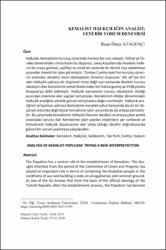KEMALİST HALKÇILIĞIN ANALİZİ: YENİ BİR YORUM DENEMESİ
Özet
Halkçılık, Kemalizmin kuruluş sürecinde merkezi bir role sahiptir. İttihat ve Terakki döneminden miras kalan bu düşünce, savaş koşullarında Anadolu halkının bir araya gelmesi, eşitlikçi ve ortak bir zeminde bir devlet inşa edebilmesiaçısından önemli bir işlev görmüştür. Türkiye Cumhuriyeti’nin kuruluş sürecinin ardından devletin resmi ideolojisinin temelini oluşturan “altı ok”tan biriolan Halkçılık yalnızca bir düşünsel miras değil aynı zamanda devletin kurucuideolojisi olan Kemalizmin temel ilkelerinden biri haline gelmiş ve 1938 yılındaAnayasa’ya dahil edilmiştir. Halkçılık kavramının kurucu ideolojinin niteliğiaçısından önemine dair yapılan tartışmalar, Kemalizmin iktidar dönemindekiHalkçılık pratiğine yönelik güncel tartışmalara doğru evrilmiştir. Halkçılık pratiğinin tartışılması yalnızca Kemalizme mesafeli yahut karşısında duran bir düşünsel ortamda değil bizzat Kemalizme içkin yorumlarda da ortaya çıkmaktadır. Bu çalışmada Kemalizmin Halkçılık ilkesinin idealleri ve ortaya çıkan pratikarasındaki soruna dair Kemalizme içkin yapılan eleştirilere yer verilecek veKemalizmin halkçılık düşüncesine dair sahip olduğu idealler doğrultusundagüncel bir yorum yapılmaya çalışılacaktır. The Populism has a central role in the establishment of Kemalism. This thought inherited from the period of the Committee of Union and Progress has played an important role in terms of combining the Anatolian people in the conditions of war and building a state on an egalitarian and common ground.As one of the Six Arrows that form the basis of the official ideology of the Turkish Republic after the establishment process, the Populism has become one of the fundamental principles of Kemalism which is not only an intellectual heritage but also the founding ideology of the state, and it was included in the Constitution in 1938. The debates on the importance of the concept of populism in terms of the nature of the founding ideology evolved into current debates on the practice of Populism in the period of Kemalism. The discussion of the practice of populism appears not only in an intellectual environment that is distant to or against Kemalism but also in the immanent interpretations of Kemalism itself. In this study, the immanent critiques of Kemalism will be included in the question of the problems between the ideals of the principle of Populism and the resulting practice and a contemporary interpretation will be made in line with the ideals of Kemalism for the idea of populism.
Kaynak
Memleket Siyaset YönetimCilt
14Sayı
32Bağlantı
https://app.trdizin.gov.tr/makale/TXpnMU1USTVPUT09https://hdl.handle.net/20.500.11857/2259
Koleksiyonlar
- Makale Koleksiyonu [443]
- TR-Dizin İndeksli Yayınlar Koleksiyonu [1037]



















